#heresy armour
Text
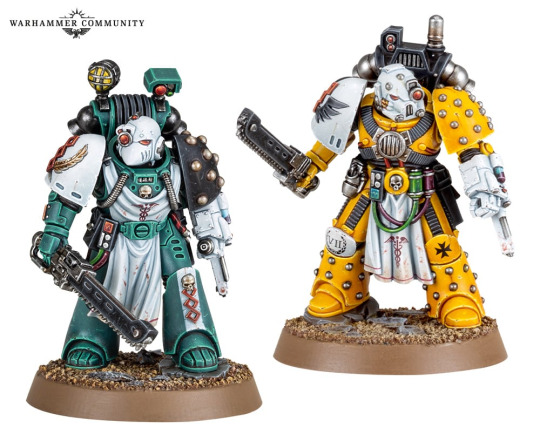
I say, "Doctor! Ain't there nothing I can take?"
#games workshop#forge world#warhammer 40k#warhammer 30k#horus heresy#age of darkness#adeptus astartes#legiones astartes#space marines#imperial fists#heretic astartes#traitor legions#sons of horus#apothecary#mk vi#corvus armour#mk v#heresy armour#warhammer community
212 notes
·
View notes
Text
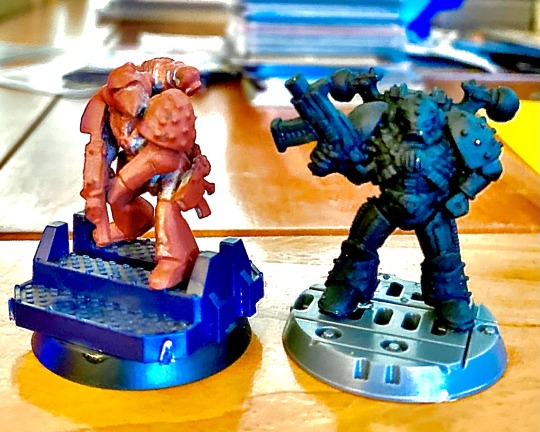
#Warhammer#40k#kill team#warhammer 40000#rogue trader#heresy armour#jes goodwin#mk v power armour#rtb01
37 notes
·
View notes
Text
Do you think that space marines occasionally pull aside random civilians to ask about really normal things?
Like just imagine a woman being called over by a space marine, a god amongst mortals and he goes “what the fuck is bread?” And he’s fully serious so she’s just like “wtf?” And he just sits there holding his hands together like this:
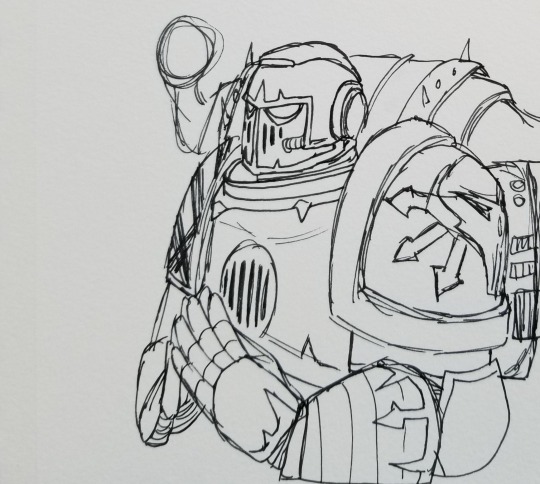
I like to imagine they do because it’s hilarious
#warhammer#warhammer 40k#40k#horus heresy#warhammer 30k#30k#space marines#do they ask about where clothes come from?#do space marines even have clothes??#do they know the purpose of clothes that aren’t armour?
23 notes
·
View notes
Text
Defeat
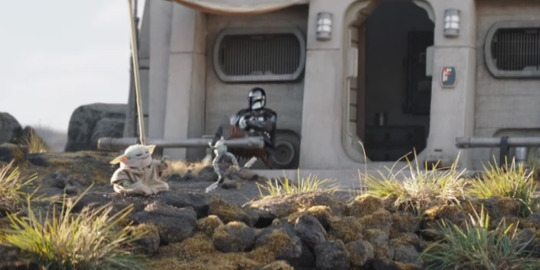
Defeat - E 18+ - Din Djarin/F!Reader - 900 words
Warnings: fluff with a side of smut. The post-Season 3 drabble nobody asked for.
Din Djarin's brooding again.
You are fairly certain he does it unconsciously, like breathing, protecting Grogu, or beating the living shit out of people. Usually, there's a correlation between those. But then there are the quiet moments, the softer moments in between the more visceral ones.
It's like he doesn't know what to do with himself now except exude an aura of I-really-wish-I-was-killing-someone-right-now.
He's sitting on the porch, feet up, watching Grogu levitate some frogs.
"Retirement doesn't suit you, Djarin," you tell him, not for the first time.
The helmet turns, and Mando--Djarin--lowers his feet as if he's ashamed, as if he's been caught doing something he shouldn't, like relaxing. To a Mandalorian, that's tantamount to heresy.
He still keeps his helmet on when he's outside.
You approach slowly, as if he's a wild animal, stopping short of extending your hand for him to sniff. The impassive helmet just stares. So you insinuate yourself onto his lap, and the vocoder digitizes a soft noise as you settle with your back against his chest.
"What are you ruminating about this time?" You watch Grogu juggle a family of amphibians, giggling.
"Nothing," Din Djarin says, a fuzzy rumble against your back. He moves your hair away from your neck, and you shiver at the brush of his gloved fingers. His thumb finds a knot in your trapezius and presses in firmly.
"Liar," you reply, but without any real venom. He's working the knot out with slow circles, and it feels quite nice, actually.
"I think I know the problem," you say, trying not to groan. He makes a noise which means go on, lifting the hairs on the back of your neck. "You're bored. There's not enough adrenaline in your system when nobody's been trying to kill you for a while."
Djarin is silent, which means you're right, but I don't like it.
"Think Grogu can keep himself occupied for a while?" you add, with the dark heat of the forge in your voice and your fingers drifting back along the outside of his thigh.
He stands, and you slip off his lap. "Perimeter's active," he says. "He won't wander too far."
There was a time when he wouldn't let Grogu out of his sight. A robust security system--the one you installed--helped. You're impossibly glad you did as you let Din Djarin grab your hand and lead you back inside the house.
He turns off the lights. Clothes hit the floor like bodies amid the thunk of weaponry and armour. Calloused skin meets yours, and you fight to kiss him, but he dodges away and applies his mouth, impossibly warm, to your neck and lower.
You don't make it easy for him. He handles you delicately--for him--but each touch weakens his defense. The sweep of your fingers over his chest, his stomach, disarms him. He wrestles to pin you to the wall, but he knows he's defeated. The battle was lost the moment he took your hand.
The bed is soft, and Din Djarin is hard above you, inside you. The stretch and burn of him is enough to unmake you. But he is trembling, his mouth open against the hollow of your collarbone, panting as if he's been running for his life. You wrap your legs around his waist and draw him in closer. His scalp is damp beneath your fingertips.
But Mando has always been pinpoint-accurate with both his aim and his timing. He rears back enough to reach between your bodies, and his trigger finger settles on your clitoris. He knows when to strike a last-minute killing blow, and this is it. You curse and cry his name, and you can just about see, in the dim half-light from under the door, the curve of a triumphant grin on his face, and that's what it does you in.
The blinding rise of your orgasm crests, burning through your nerves from his fingers and his cock. You clench around him and try to cover your own mouth with your hand, but he drags it away, pins it to the bed and leans forward to growl in your ear, "I want to hear you."
You writhe and sob, but the Mandalorian is relentless, driving into you with the force of a man possessed, to whom surviving the next thirty seconds is the only option he has left. It's not until you're limp and spent beneath him that he stops moving, that he withdraws his hand and lets you go so you can breathe again.
He keeps his weight off you, his arms bracketing your head, hips pressed to yours, savouring the twitch and shudder of you around him.
"You win," you croak as soon as your ability to speak returns.
"Just because you've surrendered doesn't mean I'm done with you yet," he says, and shifts a little atop you. Oversensitive, you gasp at the hard, wet slide of him; nearly frictionless, he's so deep inside you that you ache.
"I can't," you gasp.
But you can. And you do. And so does he.
Afterwards, he tells you it's a draw.
When you head back outside, limping a little--and there's a definite swagger to Djarin when he notices that--Grogu is more or less where you left him, sitting by the pond. His bat-wing ears twitch, and he babbles happily as the Mandalorian picks him up.
"Hey," you say, frowning as you notice something. "All the frogs are gone."
Grogu burps.
Din Djarin sighs. "Guess he won, too."
♥
#the mandalorian fanfiction#post-season 3#din djarin smut#din djarin/f!reader#mando/f!reader#din djarin x reader#mando x reader#din djarin x you#din djarin/you#din djarin/reader#the mandalorian fanfic#din djarin fic
275 notes
·
View notes
Note
Do the saints in the mez setting have ye olde fanclubs. Are there folk saints of mechs. Do people sell those like sainted tokens of like scraps of paint from the mechs or something
Not so much fanclubs in a fandom sense, that's a bit of a modern invention. They would have taken their worship very seriously and one of the most common pilgrimages of the time is a tour of all the stables, where you can get iron pilgrim badges made out of old armour plates. I have drawn Mercury and Mars wearing them before ⤵️
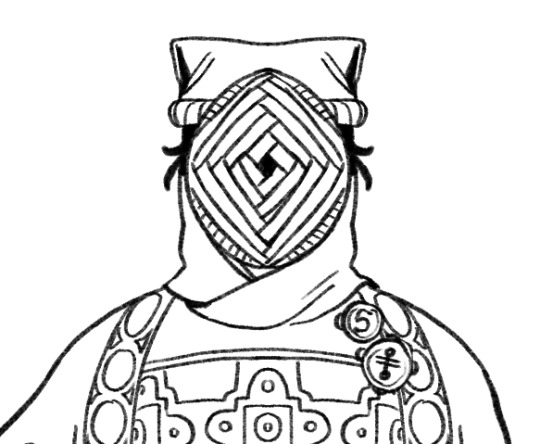
The badges are worn as a sign of devotion but also to prove that you've visited those stables, because as the stables increase in importance, they don't just let anyone wander in to see the relics and beasts. You have to prove that you've been to other stables before, the more the better, otherwise you may not be worthy of checking out the good stuff. It is expected that every member of the laity go on a pilgrimage at least once in their lives.
Craftspeople do capitalise on this by selling small devotional items that you can take home and set up in your own shrine. I've drawn one of these, a mass produced woodcut print of Leun, but these are super common and usually not of high quality, fudging details so that they might resemble any given beast if you just squint a little. This one is on the upper end, quality wise

But the most central part of how one is expected to 'commune' with a holy beast is in their breath. huffing fumes is right there in the scripture - I mean, they are practicing engine worship, so of course they're placing huge significance on the smoky part. Grifters often sell what are essentially empty bottles, claiming that they have captured some smoke or some of the beast's breath, making it, essentially, holy air. Fun fact, when an important member of the Church is dying, he has the option to request a death by engine fumes instead of a natural death, and in a severely hypoxic state they share their final wisdom with the congregation, often in the form of a prophesy.
So, onto folk saints! They do exist - assuming you mean large mechanical creatures which have not been built by the Church. in which case yep those exist, the theocracy has sole control of the fuel supply within its own borders but there are plenty of other parts of the world. But there are also beasts that straight up don't exist but are worshipped by the laity within the theocracy. Rumours of odd sightings spread into stories of some new beast who can help you fix your gout if you pray to him. The Church considers it heresy but just like in the real world, that doesn't really stop people. Except in the case of the annexed Midean region, where people practicing "idol worship" are executed.

Oh they were having one hell of a golden age before those damn Mideans decided they wanted independence about 300 years ago, and before the dragons stopped appearing with such frequency.
The slow fall of the theocracy began with the Midean civil war/war of independence, which was a narrow win for Mez but has been a burden on them ever since. The Mezian theocracy grew by annexing surrounding nations and cementing its chokehold on fuel supply, and its colonisation of Midea was what brought it to power in the first place, long before that, especially given that Midea was the world capital of of enginesmithing at the time and an exporter of fantastic technology. So that was all great, for the Church, until the war of independence which lasted almost a century. Midea lost and did not become an independent state, but it marked a significant shift in how the population believed & behaved. That's partially why Saint Lycaon was taken from Midea, he is essentially a hostage under threat of destruction if his people don't fall in line. The constant struggle to police those areas taxes the Church of its resources and civil unrest doesn't seem to be dying down any time soon.
Before the war, the theocracy's power was absolute within its own borders. After, it has retreated to its strongholds of Salvius and Forza (where the biggest stables are) and all but abandoned the more remote regions to fall to ruin. Not so much a spoiler, but a major plot point of the story, set at the end of this age, is that the final death-prophesy of a cardinal was: unless taxes were paid by the laity [dying of plague], the Church is under no obligation to send the beasts to aid them in times of peril. During the 'golden age', this would have been an unthinkable act of miserliness, and the Church would have sent those beasts out whenever and wherever, often to random villages not being attacked, just to give people a chance to see them. The massive waste of fuel was not a big deal because there was always sooo much more waiting, and the sky was full of dragons. Now, every drop must be preserved.
271 notes
·
View notes
Text
The Emperor wasn't 12 feet tall
I see this meme a lot in my Instagram feed and it really grinds my gears:
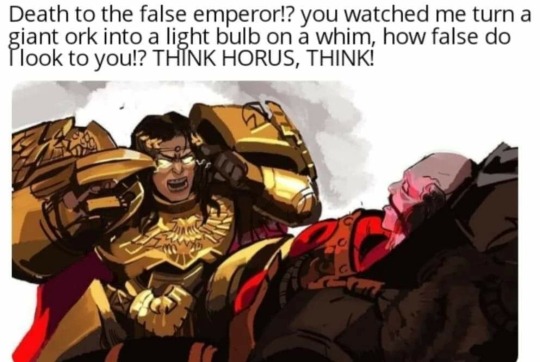
Not because it seems to be trying to shame a fictional antagonist for being "wrong" (although that really doesn't help), but because whoever made it seems to have missed that depictions of the Emperor as superhuman are meant to be Imperial Propaganda.
Now, I realise I'm going to be fighting an uphill battle here because there seem to be people working for Games Workshop and producing their media who also missed that memo, and for a while now the studio has started producing actual depictions of the Emperor, and some of those depections show him as 12 feet tall and immortal. This might be controversial but I think what this shows is that Games Workshop don't understand Games Workshop's source material.
Here's a picture of the Emperor from the original Rogue Trader rulebook.
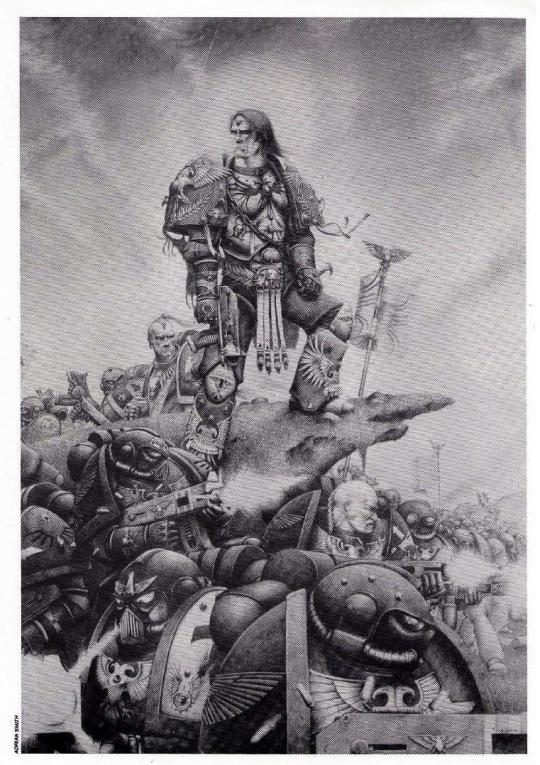
Even this is obviously meant to be a propaganda image, but here he looks like just a regular guy in armour, he's about the same size as the people around him. Not a superhuman, just a guy with an excess of hubris.
There's this literary construct called the unreliable narrator. When I studied literature we were given this short story to read called Bartleby the Scrivener. It's told from the point of view of an employer about a clerk who was apparently really difficult to manage. The subtext is that the narrator is trying to manipulate the reader to make themself look good.
For a long time, that's what Warhammer 40,000 did, the Imperium was made out to be an unreliable narrator. Stories about the Imperium's "glorious past" were told through the haze of ten thousand years of unending war, by an ecclesiastical class with a vested interest in keeping Imperial citizens committed to feeding the war machine. To the Imperium, the Great Crusade and the Horus Heresy serve the function of myths, more than history. I've gone on before about how important heroic figures like Siegfried and Perseus and Prometheus were to the Nazis. The Imperium, being a fictional state that draws on the aesthetics and ideology of Fascism, uses the figures of the Emperor and Primarchs the same way.
Basically what I'm saying is that when Imperial sources state that these people were twelve feet tall and immortal and could, um, turn a giant ork into a lightbulb on a whim, it's not because they had these powers, but because they've been ascribed these powers by their priesthood, who have total control over the flow of information in this setting.
And I get that this is hard, because most people don't get taught this stuff, and often people are probably looking for escapism from their fiction and why would the book I'm reading lie to me? But I think it really makes the setting more interesting if you look at it this way.
Also, I realise that since 2006 there have been books around that describe the Emperor, and they do show him as superhuman, and I think those depictions are based on the writers misunderstanding the material they're working from. I guess Tolkien wrote the existence of The Hobbit into Middle Earth as the Red Book of Westmarch so I can tell myself that the Horus Heresy novels are meant to be in-universe Imperial propaganda.
ADDENDUM: I need to add this because I've been reading about Perpetuals, which is apparently what the Emperor is since the Horus Heresy series was published. Apparently these individuals are human mutants that are both immortal and invincible. I remember Mechanicum heavily implying that the Emperor and St. George are the same person. Here's the problem with that. There are two themes that I think are really important in Warhammer 40,000. One is the Emperor's hubris, the idea was that he was playing god, genetically engineering monstrosities in the form of the primarchs. In the Greek tragic mould, it's this hubris that leads to his downfall. This kind of loses its sting if he's just trying to recreate what what he already is.
The other theme is the Imperium's superstition. This one is really the core of 40K. The Imperium has taken the corpse of a man who tried to rule the galaxy, told themselves he's not dead, plugged the corpse into a machine that "regenerates" him, and founded an intolerant, violent and expansionist religion around this husk. This theme changes significantly if the Emperor actually was as powerful as the Ecclesiarchy makes him out to be, and actually isn't dead, and has somehow been regenerating for the last 10,000 years. There's a question here about what would make an entity worthy of worship, or being called a god, and I probably shouldn't get into it but this is my blog so I'm going to. It seems like there's an assumption among some writers that if something can be rationally explained then it's not a god, because gods ipso facto don't exist. They've incorporated nonexistence into their definition of gods. This is where you get the idea that the Chaos gods aren't gods, because the setting explains their existince "rationally" with its internal logic (nevermind that there's nothing rational about the warp). If there were gods in a rational sense, then our model of the universe would have to change to accomodate them. I think the upshot of this is basically that if what the Horus Heresy novels claim about the Emperor is true, then the Ecclesiarchy are right and he is a god within the logic of the setting. That doesn't justify the genocide and expansionism, but maybe it does justify the worship, and that's something that I think takes away from the setting.
68 notes
·
View notes
Note
Are there any marines who could 1v1 a thunder warrior? Could a Primaris? A world eater juiced on Khorneroids?
There is a theoretical selection of named marines that could, again, in theory, take out a Thunder Warrior in single combat. I'd put Kharn, Ahriman, Abaddon and Typhus in that group, supernaturally enhanced as they are. Tyberos and Asterion definitely could.
The average primaris/firstborn/chaos marine in a 1v1, though? No. I cannot overstate how explicitly made for combat Thunder Warriors were. If it can be helped, just don't 1v1 one. Even in the Horus Heresy, when outnumbered, a healthy and lightly armed Thunder Warrior can very comfortably fight multiple marines at once. Without power armour.
There is a reason they degraded so rapidly, ultimately. They were built for one, short term thing, and they were built to do it with terrifying efficiency.
106 notes
·
View notes
Note
What are your expectations/theories for Messmer?
I have a few! I even considered making a predictions bingo on him specifically to check when DLC comes out! XD But overall the predictions resulted from me and @val-of-the-north bouncing the ideas around 🤔 I'll need to link a few of other posts here too to help clarifying some relevant topics!
___________________________________
1) I think he is one of the children between Marika and Godfrey, or maybe even her first-born!
At first I was also thinking that him having red hair was a damning evidence that he had to be born from selfcest, like Malenia and Miquella! But Val brought this to my attention that in ER manga, which is apparently on a stronger level of directing than BB comics from my knowledge, Rykard is a blond!
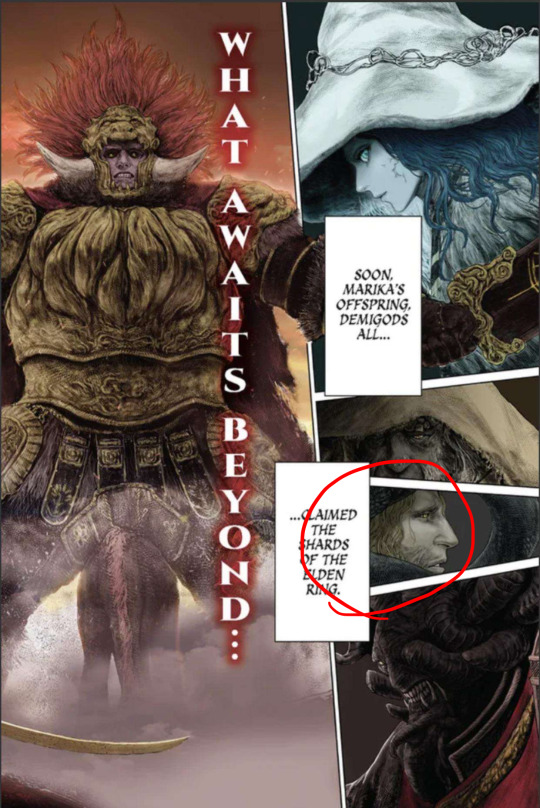
So Val suggested that genes can work a funny way since Marika and Radagon are still the same person, and if Rykard got Marika's golden hair gene even from Radagon's body, the reverse is possible and someone in Golden Lineage could have red hair even from Marika! I also agree because Miquella is venturing into the Shadows Land presumably to discover Marika's secrets:
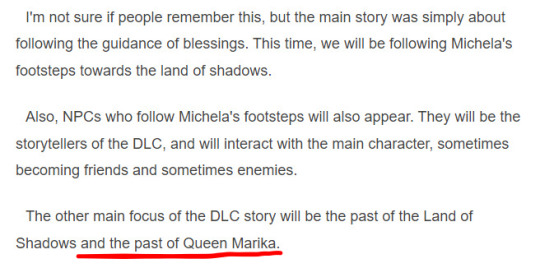
(Famitsu interview with Miyazaki, taken from this ( x ) post) But Messmer to me feels like he would be fully aware of every Marika's dark secret there is! I joke that he is very Lucifer-coded, but actually Satan-coded is a better comparison. He is the holder of "Hell", where the 'graceless' beings and those rejected by Golden Order reside, like that ancient Misbegotten(ish) creature! If he was the third sibling of this kind, why would he know more than Malenia and Miquella? (I mean, surprise me!) But if he had been there from the very start, carrying her (God's) punishment, then sure!
My other clue towards that is that he shares the "spartan" aesthetic in his clothes with Godfrey and his Duelists ( x ) (and actually Goldmask too)! This whole thing with leg wraps and waistwrap!
2) He is the first to historically partake in Dragon Communion, and the inspiration of Drake Knights
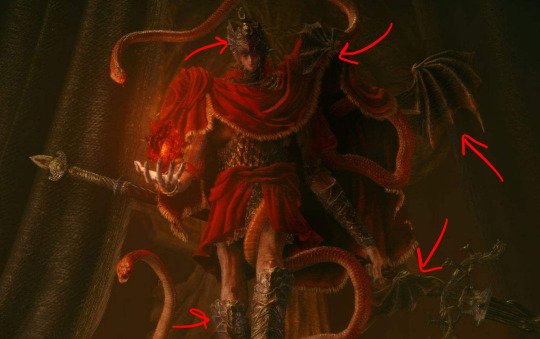

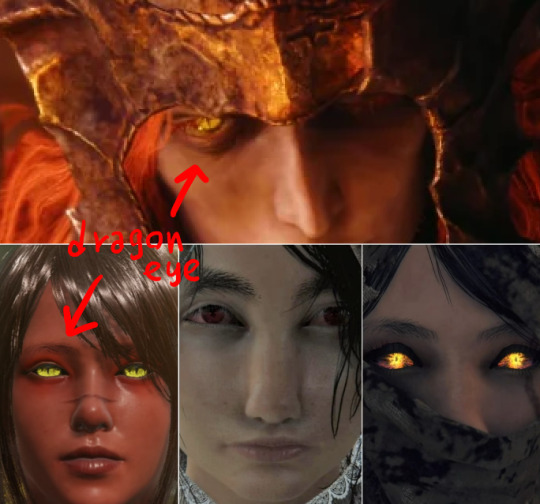
There are dragonic features about himself, the design of his armour and his snakes! Initially I thought of Dragonic Sentinels too, but their whole deal is to combat Granssax, who I concluded attacked after Farum Azula war and Placidusax' lord was fled. More than that, their deal is 'electric' line of dragons specifically, whereas Drake Knights and others who that partake in Dragon Communion are not picky! They eat dragon hearts to take their power, and that includes 'fire' line of dragons, like Greyoll and her spawn!
I speculate that he was the first person historically, with the bright idea of eating dragon heart to take its power, and this is where his fire powers came from. Fire is associated with heresy, but in his case it was both: assuming powers of dragons was heresy itself (so, before Godwyn made dragons 'friends'), but fire powers came from it! As a Demigod, he also did not meet the same miserable fate as Magma Wyrms! He had the privilege to really take something useful by being not mere mortal.
3) The snakes, therefore, are part of his body!
There are two of them, and I assume they're growing from the base of his spine and function like his tails! If Placidusax is anything to go by, this is part of him developing multiple heads but in the way that would not mess with his body too much. Funny enough, I had two dreams of Gwyndolin as a baby, and in both Gwyndolin as a child only had two snakes that did work as tails, so maybe I am biased!
4) Rotten Duelists also take inspiration from him
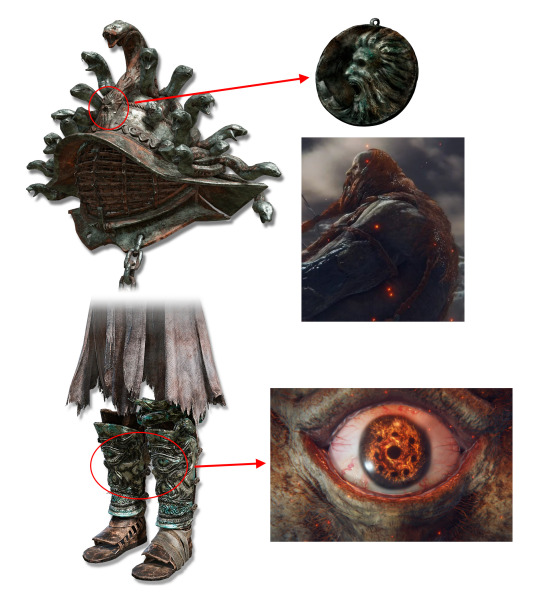
I am resharing the image by Val from a post I've already linked, but whereas they elaborate sign of Godfrey and hatred for the Giants in their design, the snakes around their arms and on their helmets are supposed to refer to Messmer!
I imagine Godfrey and Messmer being that super cool OG battle duo. Duelists feature two kinds of 'heresy' in their design - the snakes and the symbols of the Giants, and I assume they were proudly wearing these before being driven from the Coliseum! Back then symbolism of "taking power from the enemy" was something honourable, and so was what Messmer did - becoming 'sinful' to be the more powerful weapon of Marika was courageous and virtuous of him. So, snakes were also fine to proudly depict in the clothes! Until it was not:
5) He is banished for (attempted) burning of the Erdtree
This theory is coined in by @val-of-the-north! In this ( x ) post it is explained better, but in short, there are evidences that the big golden Erdtree we see is an illusion, most interesting one is ashes being all over Leyendell even before defeating Maliketh. So that's why it no longer is giving its blessed sap and is "only an object of faith" now, though its lower part is still physical of course. I agree with this idea!
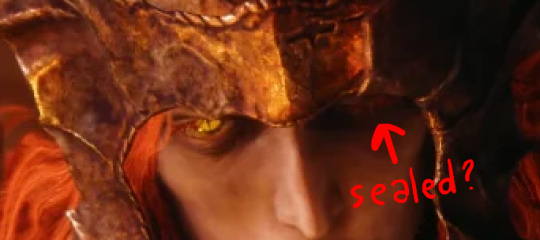
I think he had to do something bad because of the huge sealed eye possibility! Ranni and Melina also have an eye sealed, and both are Demigods that had their 'privilege' within the Golden Order removed in one way or another. Messmer, on the other way, wows to burn whoever is devoid of grace, so I doubt that he would willingly divest himself of it! Whereas he's been heretical for dragonic powers and the 'Satan' to her system to take care of the 'sinners' from the beginning, but he got excommunicated from the family and likely erased from its records! Bonus points if Godwyn being the first in the Golden Lineage is just what they tell people now!
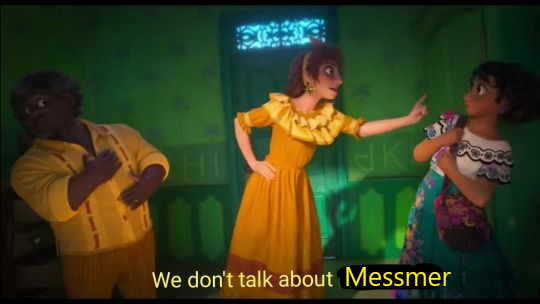
6) GEOOOOOORGGGEEEEEEE!!!!!!!!
I've always had a feeling that whereas everyone is anticipating him to become the first true Soulsborne sexyman, something just has to put a dent in it. Just something to sour the character. I can't explain it, it is like sixth sense...? But I think I finally know what it is. During answering this ask, I payed attention how even with other things put in consideration, he still appears to be loyal to his mother and the purpose she intended to him. He speaks defensive against her letting the "unworthy" to become a Lord. Like... this is not necessarily something weird, it could just be strong loyalty even against his self-interest like what we see in Maliketh or Morgott, but there is just strange sixth sense about perhaps some Freudian shit going on in his head that I can't shake, and not anti-climatic one after what they did with Mohg.
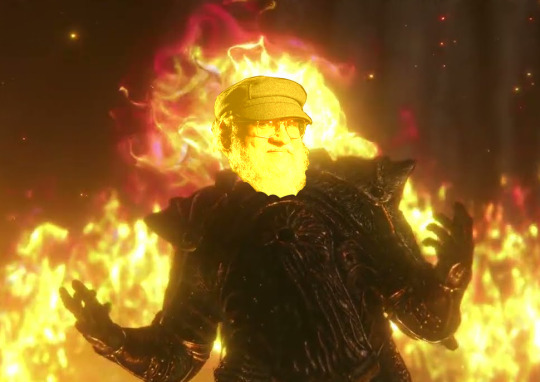
7) Motivation for attempted burning of the Erdtree were themes of ambition and perfection
I will link a couple of posts (with pictures) in which I explained how Erdtree is itself a Crucible and how I theorise existence of Omens resulted in denying and loathing the thing ( x ) ( x ). They're not too long tbh, and in both I forgot to bring up the fact that Ancestral Followers worship Minor Erdtrees :') But the main point is, everything sacred will eventually rot and die, however, giving the way to a new thing to sprout from it, and that was something Marika was unwilling to accept. Erdtree and Golden Order, were supposed to be Eternal, like herself.
Marika made everything that reminded of the other side of life, like Misbegotten and Omens, illegal, and ensured immortality in the best way she could, but Messmer took it even further. He attempted to remove the 'life' aspect of the Elden Ring, to separate the sacred power granted to his mother and relatives from the earth. So, from from inevitable death, from ever rotting, from 'cycle'... from everything "imperfect", so it could be just the one perfect, pure, 100% spiritual thing in their hands. + I think what he did happened after Gloam-Eyed Queen fiasco, so that was another point in realising the instability and imperfection. + to draw from the previous point, he might have been really pissed at Greater Will itself on behalf of his mother.
Except, what he did was not something even Marika would agree to. Greater Will specifically sought this "imperfect" world FOR its "imperfections", to gain form and purpose through births and deaths and feelings and struggles from the amorphous empty cosmic state. It was suffering from its superiority, there was nothing to love or hate or want. It gives me the same vibe as how in BB, the Great Ones are willing to trade their perfection for simple joy of loving a child; they don't need to give birth since they're immortal and their genes are not in need of surviving, but there is just... nothing in this immortality. This is something Messmer would not understand. Sellen is another example of this mindset, aspiring for the things the "perfect" beings were willing to escape. It is always the case of 'greener grass' lol
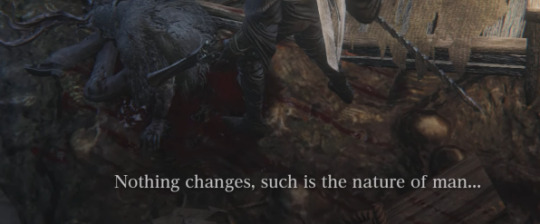
But yes, absolutely no one appreciated the attempt to separate the Elden Ring from being rooted into mortal "flawed" things. I think he still thinks he is right, and that whatever little dialogue he will have should contain quite the vitriol.
8) In the second stage of his battle, he will become far more dragonic.
I expect at least something happening with the snakes akin to becoming his wings. Maybe he will even turn into a dragon, a two-headed one! + also if there is no particularly gruesome (lethal) visceral attack by his snakes I will rebel lol
___________________
Soooo yeah... This isn't much, but my imagination is weak when I have limited information x) I have also seen an idea that the thing that pierces Marika's body might be his doing since he is titled the Impaler, but for now I think this is not the case! Her hammer is full of similar sharp shards of Elden Ring, so I think this is just another shard, or, perhaps, something Elden Beast threw at her. Red coloration comes from being bloodied! Marika was a mortal once, after all!
#elden ring#elden ring dlc#messmer the impaler#elden ring theory#screenshots#elden ring reference#ask replies
44 notes
·
View notes
Text
Cities tend to have large populations of bonded and hopeful unbonded Space and Chaos Marines. Some wanted to maintain the warbands and chapters of their original world. Yet with so many from different time periods, legions chapters and warbands, there's too many in one small area to maintain the old divides. Forced to put aside their rivalries and differences.
Majority of the city astartes started converting abandoned buildings or empty plots of land into community hubs for themselves. Many gradually work to make bases for their respective legions. Though there's a noticeable divide within the legions that turned on the Imperium during the Heresy. Not that any of them would let the humans see it.
Thousands of humans scurry about on the streets, cars and buses busy rumbling on the roads. Ignorant of what goes on beneath the surface, no one seeming to question why the astartes seem to patrol the city. The construction and upgrades around the city seem little more than security upgrades or city maintenance. Large mysterious boxes are moved and carried in plain sight between the various astartes hubs and bases.
Around the edges of the city people start to notice the beginnings of what seems like fortifications and guard posts. Some voice concerns, a handful even walking up to the group of yellow and some silver-grey armoured Space Marine to ask what they're doing. No one seems to be getting a straight answer though, if they even got a reply in the first place.
Behind heavy armour and lenses, numerous sets of superhuman eyes scan the horizon, the suburbs that surround the city they call home. Where some of their humans had ran into feral Space Marines. Would a feral group truly try to go up against a city inhabited by bonded Space Marines? None of them are sure nor are they going to simply sit around and hope for the best.
Tagged: @kit-williams • @egrets-not-regrets • @bleedingichorhearts
Tbh I think this one should fall under just rambling but idk.
27 notes
·
View notes
Text
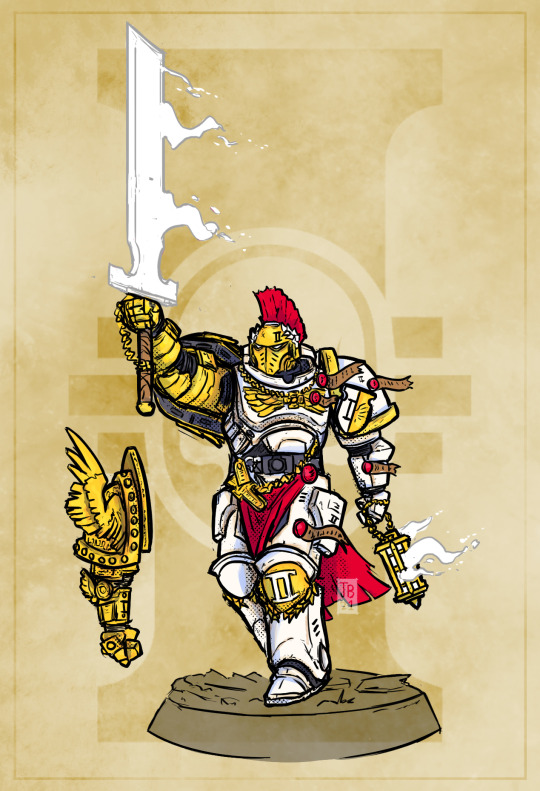
Champion of The Seraphim Order
"Once in an age on the eve of battle, a marine in the Seraphim Order will be blessed with a holy vision from the god-king-emperor himself. His words so righteous and true they deemed themselves 'immortal' by following his divine will. Blessed with the Sword of Eternal Flame and the Battle Armour of the Chapter Elders, the Champion of the Seraphim Order pledges themselves to purge the galaxy of heresy and corruption. Even among their own."

"One of the rarest and most selective Chapters in the Imperium of Man is The Seraphim Order, A chapter surrounded by zealot beliefs of perfection and purity. In its order, each battle brother's and sister's gene seed is refined through endless processes to the point where its number pales in comparison to others, where each weakness and 'heretic' trait is genetically purged and scrubbed from their records. Despite their number, they are well versed in their training and kitted with the latest and rarest of equipment, arrogantly claiming that each Marine from their order is worth 10 of any else's.
For years, the Order has been the Emperor's weapon of reckless faith, a specialised chapter in the Imperium designed to purge and destroy all its enemies. Unlike the Inquisition or even the Grey Knights, The Seraphim Order wastes no time asking questions or considering the options. When ordered to purge the unclean, they act instantly and without hesitation.
The Chapter's obsession with loyal purity led to its near-extinction after a prior Champion of the Order turned to the heresy of a void god, and led to the entire chapter being rigorously purged out of over caution. A testament to their words, "Purity through suffering".
--
Find my discord and other sites: linktr.ee/The_red_right_hand
Do not use, repost or claim (rp) my art/character
Art © The-Red-Right-Hand
55 notes
·
View notes
Text
Bandages on Broken Souls: A Nostramo Culture/Lore Post
Sometimes I think about the wee lower-deck people that were all covered in bandages in the Night Lords Trilogy. Why so bandagey? (Bandagepilled wrapmaxxers, not beating the bandage allegations, etc)
She glanced at the wretch, who was unhealthily tall and sexless in its overcloak, keeping its face behind stained bandages. Several others lurked close to the door, whispering amongst themselves. It was impossible not to smell their sweat, their stinking, bloodstained bandages, and the rancid oil-blood of their bionics.
Those ones. The attendants providing for Octavia's needs as a Navigator. Octavia's attendants.
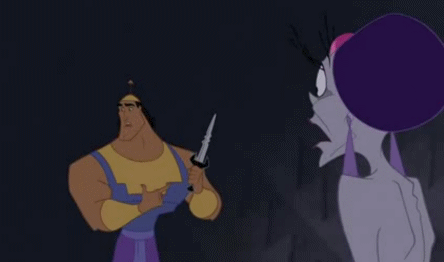
It turns out ADB does tell us a bit later on:
The chlorine reek of them offended his senses, the way it rose in a miasma from their antiseptic-soaked bandages, as if such trivial protections could ward against the changes of the warp.
This is very interesting to me for a few reasons since it can lead to various interpretations about Nostraman culture, even though it's important to bear in mind that what we're seeing is the degraded situation after however-many thousand subjective years of dicking about in the Warp, Eye of Terror etc.
They believe, or at least Ruven the POV character here thinks they believe, that warp mutation can be defended against with purely physical items i.e. bandages and disinfectant. While it's easy to point to examples of people from all kinds of cultures in the setting using spiritual or metaphysical ways to protect themselves from the warp, I find it interesting that this doesn't seem to occur to the Nostramans.
In fact, unless I'm remembering it wrong (always a possibility tbh) other than a small mention in one of the Gendor Skraivok short stories about there being a secret Lectitio Divinitatus cult among the serfs, there seems to be very little spiritual/religious belief organic to Nostramo itself.
That makes some sense, I think. It is after all Space Gotham, a world of armoured groundcars and looming starscrapers where everyone is living under some form or another of very high pressure just to survive whether that means getting their next meal or keeping their position in high level gang politics. Whatever beliefs the original settlers brought with them to the Sunless World were, I imagine, ground away over time as generations passed and people had other, more visceral concerns.
There are a few scenes in the 1984 nuclear war TV movie Threads that take place in the period about 10-20 years after the bombs have fallen. It's clear that the by now rapidly deteriorating survivors of the pre-war world are trying as best they can to provide some kind of education for their post-war descendants, but this is extremely limited and relies on what they can gather together from whatever books, VHS tapes etc happened to survive the war:

"The skeleton of a cat! A cat's skeleton!"
And we can see that it simply means nothing to the children and young adults whose entire existence revolves around basic survival - mostly food and the things they have to do in order to get it.
This, in a way, is what I think happened to whatever beliefs in anything beyond the material that may have ever existed on Nostramo by the time we see it in the Crusade/Heresy era. It's a sad, stunted little world and I feel immensely sorry for the nasty, skeevy people it produced.
Another factor affecting this would of course be the Night Haunter. You don't really need to have a spiritual/metaphorical figure or system dispensing rules and justice when Konrad is actually real and inside your home making it brutally clear what his views on law-breaking are.
So, in my usual roundabout way, we come back to the bandages again. My view, as I've expressed before in my ramblings, is that Konrad didn't truly eradicate crime on Nostramo so much as eradicate the appearance of it.
There's a legend from Ancient Greece about a Spartan boy training to be a warrior which I'll post as a screenshot below since I think we could all do with a break from my writing style for a bit:
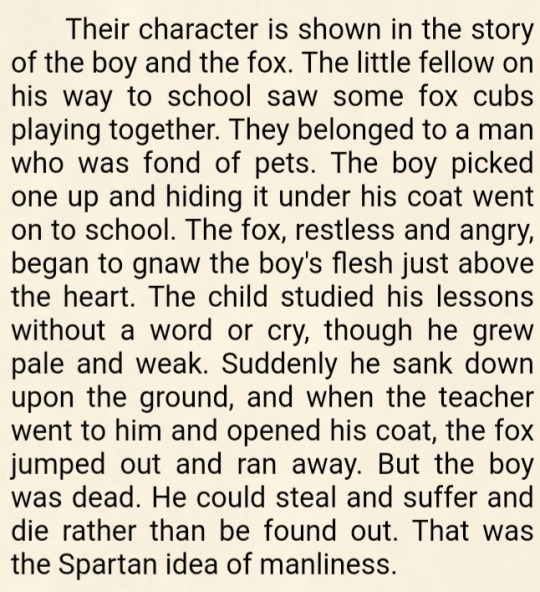
"He could steal and suffer and die rather than be found out" is the relevant part here I think. Much like the idea that snitches get stitches or the mafia code of omertà where one's value in society and life itself hinge on a mutual keeping of silence against any and all authority figures.
We know that even before Konrad arrived, Nostraman society functioned on a gang allegiance basis, so already fertile ground for a very insular and secretive type of culture. But then we add the Night Haunter to the mix and the numbers spell disaster for you at Sacrifice the social pressure in this direction ramps up massively.
It's also made very clear pretty much everywhere that Nostramo is a vicious, predatory society. There's a description in one of the Skraivok stories of Phy Orlon, the canonical smallest saddest uwu-iest Night Lord:
It astounded Skraivok how such a vulpine little thing had made it through the selection process. Even bulked by legionary gifts, Orlon still managed to convey the impression of feebleness. Towards the end, Nostramo had been providing only the dregs of the dregs. No wonder Curze had levelled the place.
Weakness was like the scent of blood in the water to the Night Lords. Legionaries like Orlon would always attach themselves to those they deemed powerful, for protection. That explained the ridiculous batwings welded to the top of his helm in emulation of Sevatar, and why he had appointed himself as Skraivok’s adjutant.
It's like prison or high school. Even the transhuman supersoldier Nostramans still function this way. What hope do ordinary people have?
Not much at all, I think. Just in order to survive day to day it'd be necessary to conceal any injury, weakness or deformity at the risk of having it being ruthlessly used against you by just about everyone.
So we come back to the bandages again. Told you I'd get there eventually. We see that the attendants are in fact completely covered in bandages Joshua Graham style:
‘Lord,’ they hissed through slits in their faces that were once lips. Their bloodstained bandages rustled as they shifted and lowered their weapons.
[...]
She raised a bandaged hand, as if she could possibly bar the warrior’s passage with a demand, let alone with her physical presence.
I can imagine the impulse to cover up and conceal any weakness applies very strongly to warp mutations of any sort. Curdled and degraded over millennia roaming the immaterium in the bowels of a ship with the changes becoming worse and worse the longer they go on, it would be plausible for this to develop into a need to cover up and disinfect every inch of oneself in order to maintain some pretence, however flimsy, of being a capable human being.
The saddest part of it for me, though, is that all of the attendants are like this. It's a situation where everyone is quite literally in the same boat, undergoing the same suffering, and yet they still retain this deeply-ingrained need to hide and conceal themselves from each other. It feels like even here, ten thousand years after its destruction, Nostramo's poison is still influencing them, still flowing through their veins to keep them separated, afraid, and deeply alone.
Oh wow, a few paragraphs from ADB somehow led to a great long wall of text. Congratulations if you've made it this far!
PS: This being ADB I feel obliged to consider the possibility of Ruven either lying or being mistaken. I don't think this is likely since he is a) also Nostraman and b) a sorcerer meaning that if there was any spiritual aspect going on he would more than likely have the requisite cultural/magical knowledge or experience to be aware of it or otherwise detect it. Ruven is a conniving goth thot but he has no reason to lie in that particular bit of his own thoughts.
#night lords#lore#nostraman culture#lore post#wh40k#warhammer 40000#warhammer 40k#horus heresy#nostramo#warhammer lore#in this house we respect Hound who deserved far better than what he got#nightlordposting#is this domestic lore? i feel like it is#domestic lore#this will be the 327th post in which i have mentioned Threads (1984) and i have become exceedingly good at it#neves loreposts
29 notes
·
View notes
Text
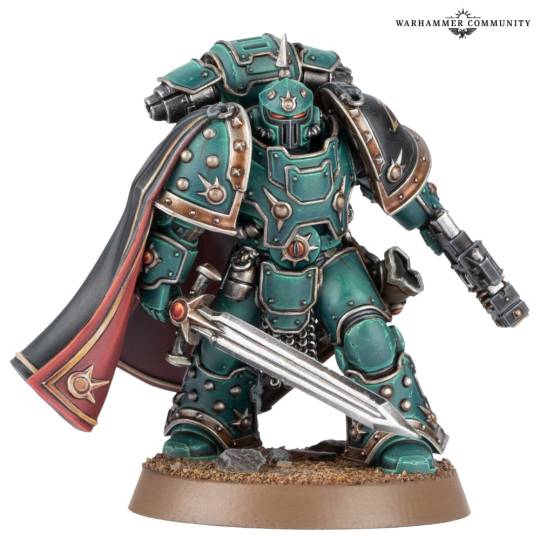

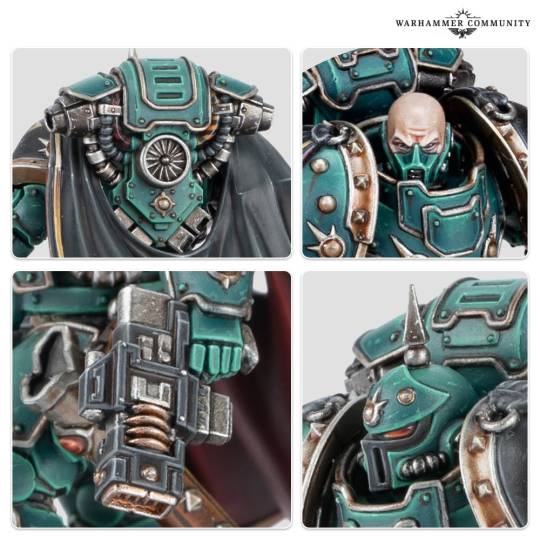
"Traitor" Champion Consul. Only traitor iconography I see on this guy is an easily shaved down belt buckle. Guy's gonna see a lot of mileage in loyalist legions with minimal conversion.
#games workshop#forge world#warhammer 40k#warhammer 30k#horus heresy#age of darkness#adeptus astartes#legiones astartes#space marines#heretic astartes#chaos space marines#traitor legions#sons of horus#mk iii#iron armour#traitor champion consul#warhammer community
291 notes
·
View notes
Text
Roboute Guilliman Primarch of the Ultramarines, Son of Tarasha Euten.
The ultramarines may suffer a lot from years of oversaturation, plot armour, coming across as codex worshipping goody goodies, along with tonnes of community memes (blueberrys + smurfs etc) to the point its became the norm to hate on them.
However, Even after many years of being a fan of the setting I can't help but find myself growing more fond of Guilliman with every passing day especially during his moments of vulnerability. Being a demigod sitting beside a mere human but wanting to shrink down and be perceived as what he actually is a son seeking help from his mother. Wanting to be ignored by the world except for one person.

I love all the epicness that comes with 40k i do; He has alot of those moments too but what makes G-Man such a good character for me is that he is unapologetically human, and it's making him very easy for me to bond to lately.
I've heard a lot of good things about his interactions with the Lion since his return and both them being more emotionally mature and experienced now. I'm still reading my way through the heresy, taking my time and enjoying it so it'll be quite a while before I get to those books.
I'm also keeping my fingers crossed as an Imperial fist fan that Dorn will return soon. The new dynamic between Dorn, Lion and Guilliman would be amazing.
60 notes
·
View notes
Text
The biggest source of information that we have about the details of the Prophidian Heresy comes, in-canon, from the book that Jet reads in ACOC when she began researching the Bulb. In that book, she learns not only about the Prophidian Heresy but also the Ramsian Doctrine. We also later find out that that’s not the only connection the two philosophies have - Belizabeth Brassica, a champion of the Ramsian Doctrine, was mentored and first ordained by a priest who adhered to (and was executed for) the Prophidian Heresy.
Which led me to think, what is the point of connection? How do these ideologies relate to each other, apart from being fringe beliefs of the Church? With what we’ve learned this season about the FDA, who uphold the Prophidian Heresy, the followers of the two beliefs seem to be at opposite ends of the spectrum. The FDA wants to stop the end of the world by filling the world with rot and decay, while Belizabeth wants to bring about the end of the world by ensuring that it is only made out of “healthy” food - hence the attempt to annihilate Candia in ACOC. On the surface, they appear to be foes, and Raphaniel even promotes the Ramsian Doctrine in an attempt to undermine the FDA.
Then I realized: sugar doesn’t rot. It can spoil if moisture gets in -Candians are more vulnerable than anyone else in Calorum to watersteel daggers- but sugar acts as a preservative. And so far, there aren’t any known Candians in the FDA.
It’s not about what they have in common ideologically but rather it’s what stands against them both. Although they may seem to have opposite goals -the FDA and the Prophidian Heresy want to “save” the world by preventing its destruction while the Ramsian Doctrine headed by Belizabeth wants the end of the world to come- where they are both similar is that there is room in neither philosophy for Candians. Sugar does not rot, that is a whole part of the world that theoretically remains palatable to the Hungry One. Sugar is “junk food” (according to the Ramsian Doctrine), the Hungry One will not eat the world so long as it is unhealthy. The followers of both heresies may be working to different ends but as per the details of their beliefs, neither group can succeed in their desired goals as long as Candians continue to exist.
I don’t know what, if anything, this means for The Ravening War. We know that the FDA’s plan does not succeed, although we don’t know how it happens. But I think it’s significant to the worldbuilding of Calorum that the biggest heresies of the Church (that we know of), the heresies which so many prominent Church leaders seem to hold to, are fundamentally hostile to the existence of Candia. And I think that even if the vast majority of ordinary Bulbians probably consider these beliefs fringe and heretical, it doesn’t mean that the leaders at the top who do adhere to them aren’t using their influence to promote subtler anti-Candian ideologies.
You don’t get to a genocidal crusade from nowhere. You don’t just declare one day that it’s going to happen, everyone get your armour on and grab a blade and torch, and people just listen to you. But if you spend years cultivating mystery and fear, spreading rumours but never confirmed facts of strange Candian alchemy, that’s how you start to other Candians so that by the time you get to the point where you’re ready to make a move against them, people perceive them as mysterious heathen others “not like us.”
#dimension 20#the ravening war#dimension 20 spoilers#the ravening war spoilers#this is not very eloquent and is probably two different posts in one but i just think there's something telling here#how the most influential church leaders for decades and maybe centuries had beliefs or belonged to organizations#which were fundamentally at odds with candia#candia is singled out as the 'junk food' of the ramsian doctrine#candy does not rot (and ironically if the fda's plan succeeds; candians should be the people least affected by the mycelium)
90 notes
·
View notes
Text
Musings on Custodes: Talons Apart
Is there a rift between the Adeptus Custodes and the Sisters of Silence? There must be, right?
If Custodes have not enough lore, then the Anathema Psykana have next to none. They are played up as the almost-as-important-as-Custodes-no-seriously-trust-us in that charming GW way, but most of their lore so far fits on a single codex page.
The second talon of the Emperor, the Pale Scourge, the Null Maidens - they are depicted as ferocious and as loyal to the Emperor as Custodians themselves, but where the latter have their whole "literally built around the Emperor's identity" thing, the Sisterhood somehow arrives to the same level of devotion by more conventional means. And here I would have loved to present my examples of how their brand of fixation on the Emperor differs from that of Custodians or the other all-female warrior sorority... IF I HAD ANY! I'd say their relationship with the Emperor and their duty deserves its own separate post, but that would be straight up just me coming up with headcanons for them (which I might still do). When it comes to any sort of meaningful worldbuilding that is not just rank structure and training regime - yeah, the girls got no lore, or, rather, no theme.
By themselves, that is. As a part of the Talons of the Emperor however...
Well, no, no real thematic depth materializes for them once they are placed next to the golden demigods, but the two factions do make an effective pair - dread and awe, silver and gold, the natural and the artificial evolutions of humanity, psychic and physical armour of the Emperor. Some sources say that the Sisters first appeared at the Emperor's side during the Great Crusade, but others insist that when he made his Custodians ages before, he made them specifically resistant to the powers of the null... So there is chance that the two factions were straight up designed to compliment each other and work together, which they did well... until they didn't.
Because in the current state of the lore, it seems that they haven't actually been working together between the Horus Heresy and the Era Indomitus.
The Anathema Psykana came out of the other end of the Horus Heresy in no better state than Custodes. Once again - all the numbers are very vague and we don't even really know how many of them there were to begin with and yada-yada - what's important is that the end of the Siege of Terra left the Sisterhood in shambles. But unlike Custodes - and here we come to one of the few pieces of interesting worldbuilding that sisters do have - they never had the opportunity to recover. By the time Guilliman rolls up to Terra in "present day" 40k, the Sisterhood is still a shadow of its former self, its members extremely few and scattered.
So what happened? Well, the codex states the following: "Without the Emperor to support them, and with Custodians looking inward after their failure to protect the Master of Mankind, the natural aversion many felt towards Blanks led the Sister's political enemies to drive them out of positions of influence." And isn't that a whole story in disguise? After the Heresy, the Sisters came into conflict with other imperial institutions - a conflict they did not win - and Custodes did nothing to intervene. Surely such a breaking of bonds of fellowship has consequences?
Custodes were obviously deeply affected by the "death" of the Emperor. They blamed themselves for it - hence the black cloaks and ten thousand years of moping around. They blamed the primarchs - Guilliman rises as the last loyal son of the Emperor and receives direct divine guidance from his father, and they still run drills on how to kill him. They blamed the Astartes - the Phalanx, hanging above Terra as its most devout defender, is infested by the Custodians ready to bring it down at the first sign of treachery. Did they blame the Sisters too, then? Did they knowingly abandon their counterparts to the judgment of degrading Imperium, seeing it as a fitting punishment for a failure of duty? Have they preserved this sentiment across the millenia? Or did they come to realize their betrayal for what it was? If so, why have they never sought the remaining Sisters out? Or have they? When they encountered the Brides of the Emperor thousands of years later - did it stir something in them? Was Captain-General reaching out to them not solely about the solution to the Van Dire crisis?
It is specifically pointed out that high Custodes casualties in the battle against Khorne's demons at the Lion's Gate were caused by the absence of the Sisters of Silence at their side. Did they re-embrace the ancient partnership out of purely practical necessity, or was it a true rekindling of bonds? Could it even be such for those custodians who began their vigil after the demigods and the blanks have parted ways?
And what is the Sisters' side of the story? The lore that we have is pretty clear on the fact that, despite being abandoned by their allies and shunned by the Imperium's caracss, they never shirked their duties. Left without any official support and recognition of their status, persecuted and sometimes downright hunted - Space Marine legions have rebelled for less. And yet, as reduced as the Sisterhood became, for ten millenia Black Ships somehow still prowled the stars, and the sacrifices to the Carrion God were still being delivered. Did they feel betrayed? By the Imperium they served and partners they fought alongside? And what carried them through? Was it all solemn duty and grim determination? For how many generations could those last you? And what can motivate an organization for ten thousand years instead?
How strong is their institutional memory? Are the annals of their order's history lost to the Sisters of the Era Indomitus, like it is with so many other - much better supported - imperial institutions? Do they know about the rift between their forebears and the Ten Thousand? Do they carry resentment towards the Custodians? Do they know why?
And now that the Talons bite together again - do they do so earnestly, the synergy woven into the very structure of both orders restored? Or is there an unspoken divide between them still? Was there any sort of official reconciliation? Do either feel a need for one? And after ten thousand years of potential bitterness and resentment - is it even possible?
#btw - one of the tts podcast episodes 'shows' sisters working together with custodians#even though Guilliman has not yet returned and no alternative restoration event for them seemed to have occurred#in practice this is probably just a mistake on the tts team's part#much like the 'mom Everest' thing#but I choose to believe that this is actually the feature of the AU#and Kitten has solved the whole thing with some healthy communication as his first act as the captain-general#once again proving himself the best#musings on custodes#adeptus custodes#sisters of silence#warhammer 40000
12 notes
·
View notes
Note
All this selfish and unselfish talk is really seeming like a theme. Renfield is ASAS (Assigned Selfish At Seward's), Seward says he's singled out Renfield out of personal interest, Dracula is selfish but promises to share Jonathan after he's used him, Quincey says he's a friend, who is more selfishless than a lover, and Jonathan declares he puts his boss' interests over his self.
Hi, I've been laughing at ASAS for a month now.
You're right, though! Seward is the only person who has ever actually directly said the word 'selfish' and then only when referring to Renfield, but it obviously characterizes his own behavior with regards to Renfield as well. And he does seem to realize that. But it stands in contrast to his reaction to Lucy's rejection. While the way his proposal was phrased sure came off more selfish than Quincey's, both of them were really good about respecting her feelings for someone else and supporting their friend in the aftermath (again, Quincey came off more so than Jack but I think it's at least part hiding his feelings/the difference between correspondence and private diary. They both do want to support Lucy and Arthur).
So here we have some really unselfish behavior in the suitor squad... which in itself makes Lucy feel selfish and guilty about prioritizing her own feelings: "Why can't they let a girl marry three men, or as many as want her, and save all this trouble? But this is heresy, and I must not say it." That line isn't actually about her being in love with all three men, it's about her feeling bad that she's hurting them by not being able to match their emotions or give them what they want, since they're such good people. And yet she feels bad for mentioning it, too, since that's not a socially acceptable solution to even bring up.
Meanwhile in Castle Dracula there's an inverse of that scene playing out with Jonathan and the vampire women. They are grasping for someone who isn't theirs, perhaps greedily/selfishly - but just like the suitors, they're willing to share and respect one another. Dracula comes in to stop them, selfishly keeping Jonathan all for himself - but only to a point. He'll share with them later, he just gets first dibs.
And obviously Jonathan who has to sacrifice his own interests for others. There's just this back-and-forth with selfishness and unselfishness, and kind of interestingly the narration does seem to land on the same conclusion as Seward:
...a possibly dangerous man, probably dangerous if unselfish. In selfish men caution is as secure an armour for their foes as for themselves. What I think of on this point is, when self is the fixed point the centripetal force is balanced with the centrifugal; when duty, a cause, etc., is the fixed point, the latter force is paramount, and only accident or a series of accidents can balance it.
Translating to plainer English, Seward essentially hypothesizes that people who are very self-centered want to ensure their own safety, and in doing so weaken themselves by leaving opportunities for a foe to exploit. Those who subsume their own personal desires or safety in favor of a greater cause or duty are way more dangerous since they will ignore limits and thus be harder to counter.
So, if we look at the characters in these lines, so far this is kinda what I see:
Renfield - currently selfish; as long as he doesn't find a greater cause to serve he's not likely to be dangerous despite being very clever and intriguing
Seward - selfish with Renfield and thus more vulnerable to being mistaken/manipulated/in the wrong with him. Unselfish with Lucy and thus possibly more dangerous on her behalf (same goes for Quincey on this point).
Lucy - Not actually behaving in a badly selfish way but feels like she is, and that may count enough to make her vulnerable. Emotionally at least she sure did get hurt by refusing them, seeing as she cried a lot for them and all.
Mina - So far selfishness hasn't come up with her, but any leanings so far are a lovely mix of both in a way. She's learning things to help Jonathan (unselfish) but those also happen to be exactly what she wants (selfish). We'll have to wait and see where she lands in the end.
Jonathan - It gets interesting here because he seems "unselfish" from the start given how he is serving others' interests, but if we follow Seward's definition then up until the very end of his stay Jonathan was still trying to prolong his own life and play it safe, thus acting "selfishly". He did take calculated risks along the way (and some uncalculated ones) but always reverted to being careful in the end, serving his own interests as much as any duty. It's only when he throws caution to the wind and submits to a duty to try and stop Dracula at all costs that he truly becomes dangerous to the Count (on shovel day)... but on the other hand, he definitely wouldn't have lived long enough to be a threat if he hadn't balanced things out by playing along with the game and simultaneously seeking information wherever he could. Also he does specifically call it a "wild desire" so it certainly fits that part of being selfish as well. Sort of fits the theory, sort of doesn't.
Dracula - Selfish and also made quite vulnerable by it! He defers sharing Jonathan until he's leaving town anyway, so he's not actually being very unselfish with him there. But more to the point, he's selfish both in the sense of taking what he wants, and in the sense of trying to protect himself. Keeping Jonathan around that long was the former, and it already backfired once by giving Jonathan enough time/opportunity to take a whack at him and injure him slightly. The journal too is a danger if it gets out. And he's obviously got layered plans (multiple lawyers, fifty boxes) which surely are intended to keep him safe. If this rule persists then perhaps those very cautious acts (or others we are yet to see) might open him up to counterattacks later on.
Vampire ladies - Selfish to others but unselfish with one another. Hypothetically this would make them more dangerous when someone they care about/respect is on the line, but nothing of the sort has happened. Certainly they are both more antagonistic and vulnerable to Dracula, but Jonathan didn't find any way to deal with them safely himself. It's not like selfishness automatically guarantees defeat though, just gives more opportunities.
There are several other more spoilery instances and considerations I could bring up too, but I'll keep them out of this ask for now. It's an interesting definition of selfishness and not everything fits it perfectly, but what does sure is fun to think about.
71 notes
·
View notes